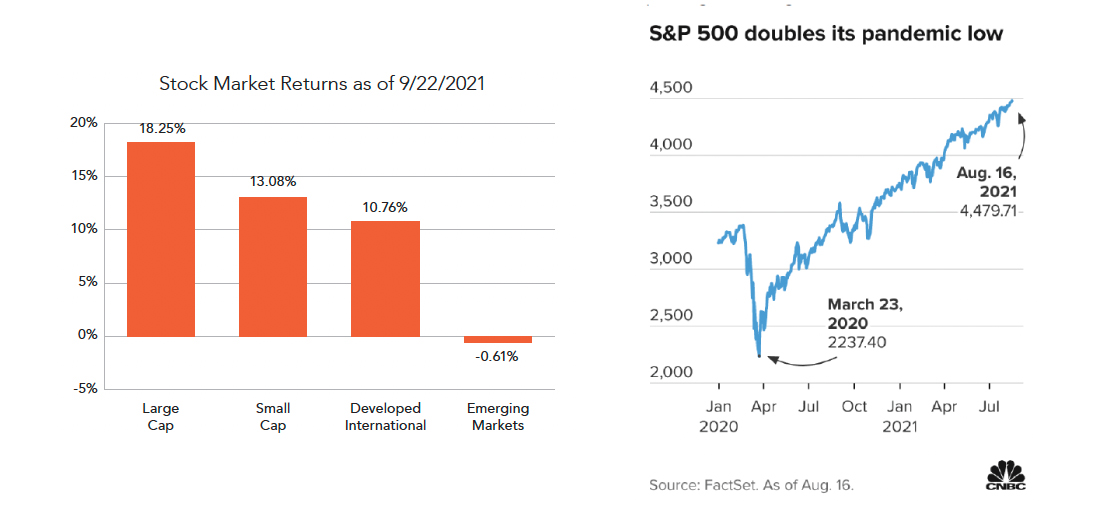Inflation: What Lies Ahead?
If you had to pick a hot topic for the quarter, one of the first things you may think of is inflation. There are conversations and news articles about it almost every day. While inflation has spiked this year from the decade-low levels, the bigger question is whether it is truly transitory like the Fed states or is it a longer-term concern for investors, as well as individuals. We are all paying more for food, gas, and daily purchases, but will inflation continue to increase at higher levels or fall back to the 2% range the Fed has targeted? While no one knows for certain what inflation will be in the future, it may be a good time to look at both sides of the argument.
Let’s start with the transitory argument. The Fed believes that the pricing pressure and inflation spike are primarily due to transitory events such as supply chain shock, labor shortages and strong demand for services as the economy reopened. Lumber spiked in 2020 and early 2021 but has now fallen back to levels pre-pandemic. Used cars, rental cars, and airline tickets all spiked in May and June but have since fallen back to more normal levels as demand has declined and more supply is available. These are examples of what the Fed sees as transitory: pricing spikes up, retracement to lower levels and slow, steady price increases going forward. There continue to be semi-conductor chip shortages impacting supply and availability for many products ranging from cars to appliances to computers. As we all know, supply and demand determine price, and shortages can lead to higher prices as the end user will pay more to attain the desired product. As these shortages subside, pricing will become more normal. The risk here is that the supply chain issue may take longer than anticipated to correct.
While the Fed believes the current inflation is transitory, other factors play into inflation and impact the long-term trend. Levels of sustained inflation are dependent on growth factors, fiscal policy, and credit growth. The global economy has experienced a strong growth rebound following the pandemic, but will the growth rate continue at the torrid pace of the first quarter of 2021? We do not believe it is sustainable in the United States and many developed nations. GDP growth is a result of population growth and productivity gains. While productivity will continue to improve, population growth will limit potential GDP growth across developed nations. Even China has an aging demographic, and growth potential has slowed dramatically. Recent news out of China regarding Evergrande and debt worries are unfavorable for their economic growth, and commodity prices other than oil reflect this. Iron ore, platinum and copper have retreated from highs set in the spring.
Global fiscal stimulus since early 2020 has been extensive with excess liquidity in the marketplace. The money supply will create high inflation only if there is sustained economic activity that results in rapid credit growth. At this time, credit growth and the velocity of money (the turnover rate to buy goods and services) are low and without these, inflationary pressures will subside. The shortage of labor and the current state of wage pressures can also be seen as inflationary, but the question is once jobs are filled, will annual wage increases be higher? This phenomenon once again may be a “one-time” jump and then level off. When you add up all these points, it could suggest that the inflation increase is transitory.
If you look at the other side of the inflation argument, you could start with the labor market and wage pressures. Because the participation rate in the labor market has declined and there are fewer available workers, companies may have to continue to increase wages to retain and attract employees. Productivity increases may not offset these additional costs, leading companies to increase prices to the end user. The housing component of the Consumer Price Index (CPI) makes up greater than 30% of the number. Throughout the pandemic, the eviction moratorium put a lid on rents. With the moratorium coming to an end, rent prices may begin to increase again. Historically, rents have tended to lag the Case-Shiller home price index by two years and most recently, the Case-Shiller has increased greater than 18% year-over-year. If rent prices follow accordingly, this will impact the housing component in the CPI leading to a higher inflation rate. Taking the opposing side of the impact on inflation with the extremely low velocity of money and slow credit growth, if either sees an uptick, higher inflation may be just around the corner.
Before the pandemic, just-in-time inventories were the standard, but many manufacturers and producers found themselves caught short-handed when the shutdown hit. Demand for products was still there, but the components to produce the products were not available. Will the world move to more local production and more inventories on hand? This action could also result in higher inflation depending on location and the increased demand to get inventories at a comfortable level.
There are many unknowns when contemplating the future inflation rate, but market expectations by consumers and 5- and 10- year forward markets are for lower inflation in 2022 and years after. In addition, growth expectations, as measured by GDP, are likely to retreat to trend growth seen pre-pandemic. Our outlook is for a continued strong 2021 and early 2022 with growth trending to the 2% to 2.5% range longer-term. As pent-up demand subsides and supply chains function, inflation may move closer to the Fed target of 2%. However, it may be closer to 2023 before reaching that level. Historically when the Fed has started to retrace quantitative easing, inflation has declined. Will it be different this time? We will continue to monitor closely and adjust portfolios. A reasonable level of inflation can be a positive for equity markets but may put some minimal pressure on interest rates. The current dynamics in the market lead us to remain slightly overweight equities with an underweight to bonds.





